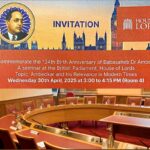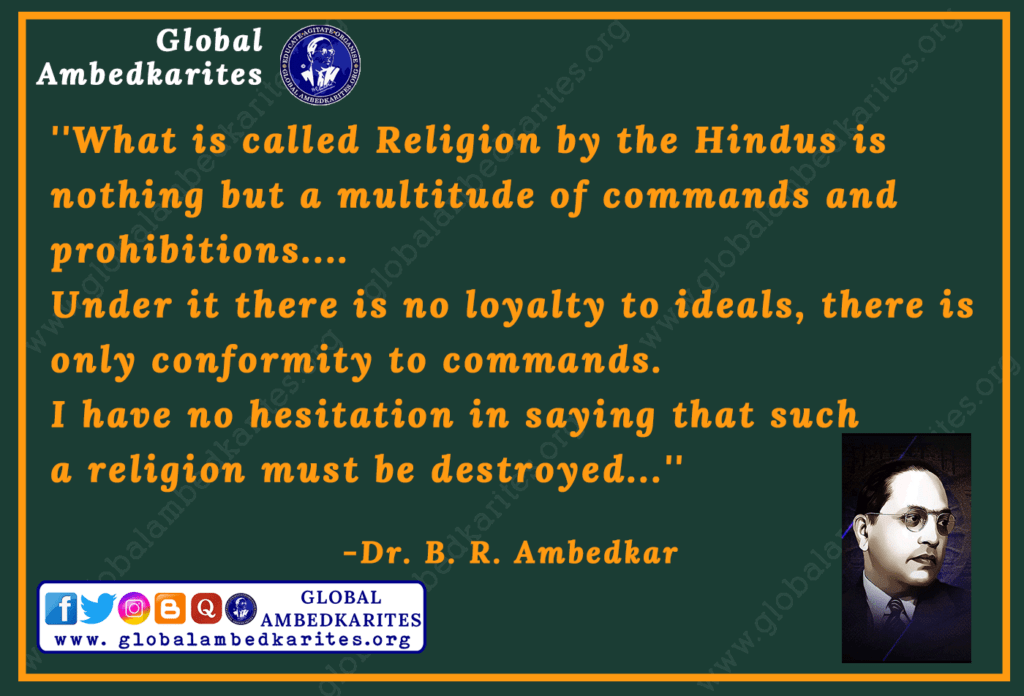
Did Dr. B. R. Ambedkar hate Hinduism?
Editor’s Note: The following article is from a series of questions answered by Mr. Shekhar Bodhakar
A genuine attempt has been made to answer this question from an unbiased point of view.
Before we attempt to answer this question, we need to be fairly convinced that Dr. Ambedkar really did hate Hinduism. If he didnt, it would make no sense to answer the question which demands reasons for this hatred.
Most of the answers I have read imply that he didn’t hate Hinduism but the caste system. This means that as far as the questioner is concerned, the question remains unanswered (Yet it seems responders have provided fairly detailed answers).
Did Dr. Ambedkar hate Hinduism ?
The following two quotes of Dr Ambedkar suggests that he did ;
•“Though I was born a Hindu, I solemnly assure you that I will not die as a Hindu.”
•“Hindu raj must be prevented at any cost” (Dr. Ambedkar did not say anything remotely similar to this about any other belief system)
Furthermore, the following two deductions also imply that Dr. Ambedkar hated the concept of Hinduism.
• His famous ‘ 22 vows for converts and reverts to Buddhism’ are specifically aimed at raising awareness about the dangers of being influenced by Hinduism and no other belief system.
• No one can put forward a sensible argument that Dr. Ambedkar did not hate the caste system. Since he equated the ‘caste system’ to ‘Hinduism’, it therefore means that he hated Hinduism.
Hinduism = Casteism (Caste System)
AND
Casteism = Hinduism
Now that we have established Dr. Ambedkar wasn’t at all fond of Hinduism, we can answer the main question.. WHY ?
The answer is self evident from the following quotes by Dr. Ambedkar himself, grouped under five categories A, B, C, D & E.
B) On Food
C) On democracy
D) On Hindu nationalism and Pakistan
E) On Buddhism and conversion
>>>>>>>>>>>>>>>>>>>>>>>>>>>>>>>>>>>>>>>>>>>>
From Dr. B. R. Ambedkar: Writings and Speeches, vol.3, p.267 (On the chapter, “The triumph of Brahminism: regicide or the birth of counter-revolution”)
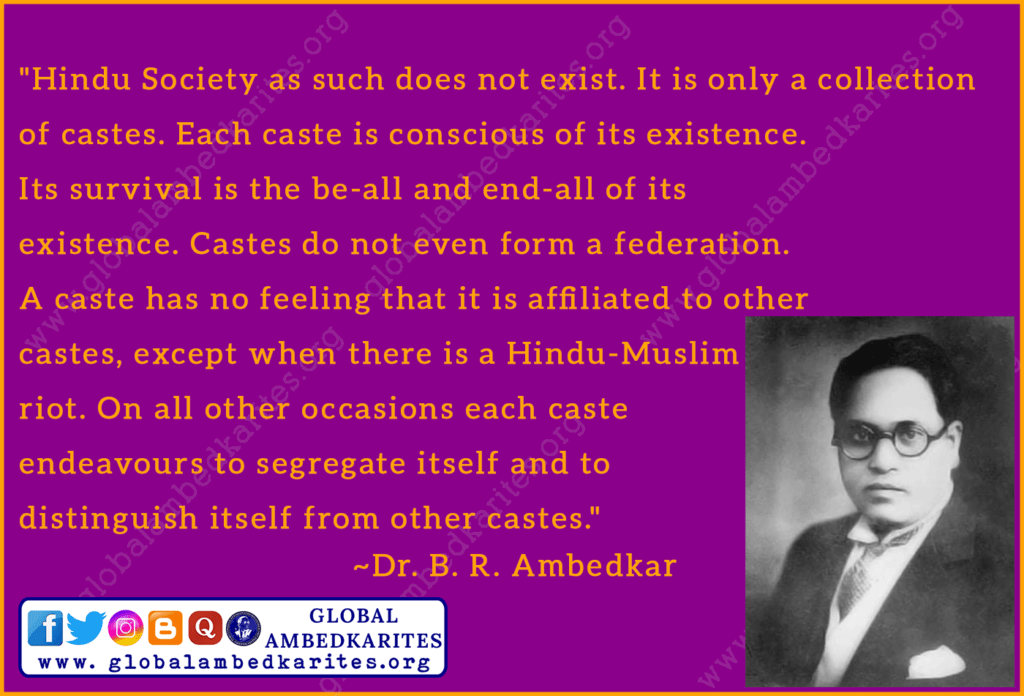
1. “The first and foremost thing that must be recognised is that Hindu Society is a myth. The name Hindu is itself a foreign name. It was given by the Mohammedans to the natives for the purpose of distinguishing themselves [from them]. It does not occur in any Sanskrit work prior to the Mohammedan invasion. They did not feel the necessity of a common name, because they had no conception of their having constituted a community. Hindu Society as such does not exist. It is only a collection of castes. Each caste is conscious of its existence. Its survival is the be-all and end-all of its existence. Castes do not even form a federation. A caste has no feeling that it is affiliated to other castes, except when there is a Hindu-Muslim riot. On all other occasions each caste endeavours to segregate itself and to distinguish itself from other castes.”
2. “I shall be satisfied if I make the Hindus realise that they are the sick men of India, and that their sickness is causing danger to the health and happiness of other Indians.”
3. “Indeed the ideal Hindu must be like a rat living in his own hole, refusing to have any contact with others. There is an utter lack among the Hindus of what the sociologists call ‘consciousness of kind’. There is no Hindu consciousness of kind. In every Hindu the consciousness that exists is the consciousness of his caste. That is the reason why the Hindus cannot be said to form a society or a nation.”
4. “Anyone who relies on an attempt to turn the members of the caste Hindus into better men by improving their personal character is in my judgment wasting his energy and bugging an illusion.”
5. “In my view, what is wrong is their religion, which has inculcated this notion of Caste. If this is correct, then obviously the enemy, you must grapple with is not the people who observe Caste, but the Shastras which teach them this religion of Caste.”
6. ” I have no hesitation in saying that if the Mohammedan has been cruel, the Hindu has been mean; and meanness is worse than cruelty.”
7. “To put the matter in general terms, Hinduism and social union are incompatible. By its very genius Hinduism believes in social separation, which is another name for social disunity and even creates social separation. If Hindus wish to be one, they will have to discard Hinduism. They cannot be one without violating Hinduism. Hinduism is the greatest obstacle to Hindu Unity. Hinduism cannot create that longing to belong which is the basis of all social unity. On the contrary Hinduism creates an eagerness to separate.”
8. “In the Hindu religion, one can[not] have freedom of speech. A Hindu must surrender his freedom of speech. He must act according to the Vedas. If the Vedas do not support the actions, instructions must be sought from the Smritis, and if the Smritis fail to provide any such instructions, he must follow in the footsteps of the great men. He is not supposed to reason. Hence, so long as you are in the Hindu religion, you cannot expect to have freedom of thought.“
9. “If a person tells you that he is a Hindu. You feel bound to inquire into his caste. Why? Because so essential is caste in the case of a Hindu, that without knowing it you do not feel sure what sort of a being he is.”
10. “In Hinduism, conscience, reason and independent thinking have no scope for development.”
11. ” Caste may be bad. Caste may lead to conduct so gross as to be called man’s inhumanity to man. All the same, it must be recognised that the Hindus observe Caste not because they are inhuman or wrong-headed. They observe Caste because they are deeply religious.”
B) On Food
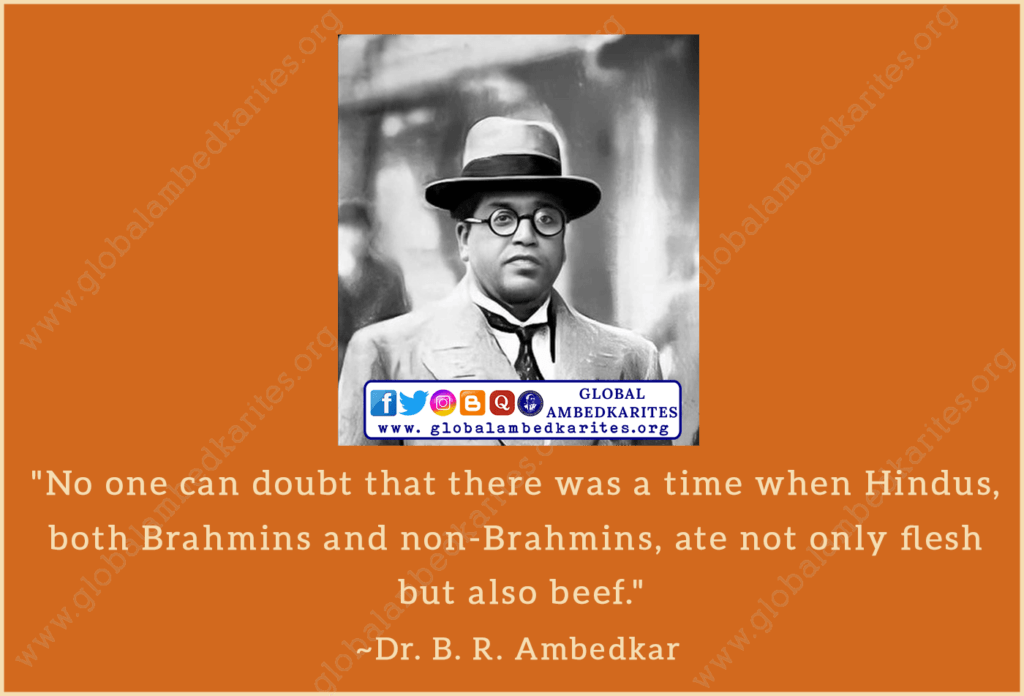
1. “One can quite understand vegetarianism. One can quite understand meat-eating. But it is difficult to understand why a person who is a flesh-eater should object to one kind of flesh, namely cow’s flesh. This is an anomaly which calls for explanation.”
2. “The Census Returns show that the meat of the dead cow forms the chief item of food consumed by communities which are generally classified as untouchable communities. No Hindu community, however low, will touch cow’s flesh. There is no community which is really an Untouchable community which has not something to do with the dead cow. Some eat her flesh, some remove the skin, some manufacture articles out of her skin and bones.”
3. “The Touchables, whether they are vegetarians or flesh-eaters, are united in their objection to eat cow’s flesh. As against them stand the Untouchables, who eat cow’s flesh without compunction and as a matter of course and habit.”
4. “…no one can doubt that there was a time when Hindus, both Brahmins and non-Brahmins, ate not only flesh but also beef.”
5. “That the object of the Brahmins in giving up beef-eating was to snatch away from the Buddhist Bhikshus the supremacy they had acquired is evidenced by the adoption of vegetarianism by Brahmins.”
C) On democracy
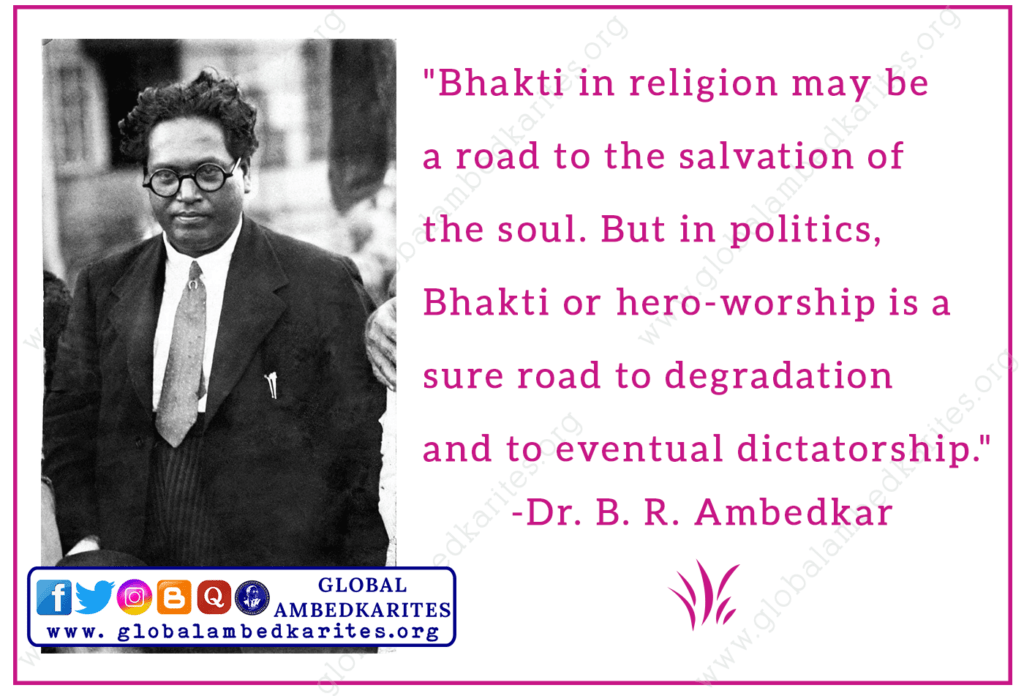
1. “In India, Bhakti or what may be called the path of devotion or hero-worship, plays a part in its politics unequalled in magnitude by the part it plays in the politics of any other country in the world. Bhakti in religion may be a road to the salvation of the soul. But in politics, Bhakti or hero-worship is a sure road to degradation and to eventual dictatorship.”
2. “I do not want that our loyalty as Indians should be in the slightest way affected by any competitive loyalty whether that loyalty arises out of our religion, out of our culture or out of our language. I want all people to be Indians first, Indian last and nothing else but Indians.”
D) On Hindu nationalism and Pakistan

1. “If Hindu Raj does become a fact, it will, no doubt be the greatest calamity for this country. No matter what the Hindus say, Hinduism is a menace to liberty, equality and fraternity. It is incompatible with democracy. Hindu raj must be prevented at any cost.”
2. “But it is right to ask if the Musalmans are the only sufferers from the evils that admittedly result from the undemocratic character of Hindu society. Are not themillions of Shudras and non-Brahmins, or millions of the Untouchables, suffering the worst consequences of the undemocratic character of Hindu society?”
3. “Not partition, but the abolition of the Muslim League and the formation of a mixed party of Hindus and Muslims is the only effective way of burying the ghost of Hindu Raj.”
4. “This attitude of keeping education, wealth and power as a close preserve for themselves and refusing to share it, which the high caste Hindus have developed in their relation with the lower classes of Hindus, is sought to be extended by them to the Muslims. They want to exclude the Muslims from place and power, as they have done to the lower class Hindus. This trait of the high caste Hindus is the key to the understanding of their politics.”
5. “.. high caste of Hindus who have denied and deprived them of ordinary human right for centuries.”
E) On Buddhism and conversion
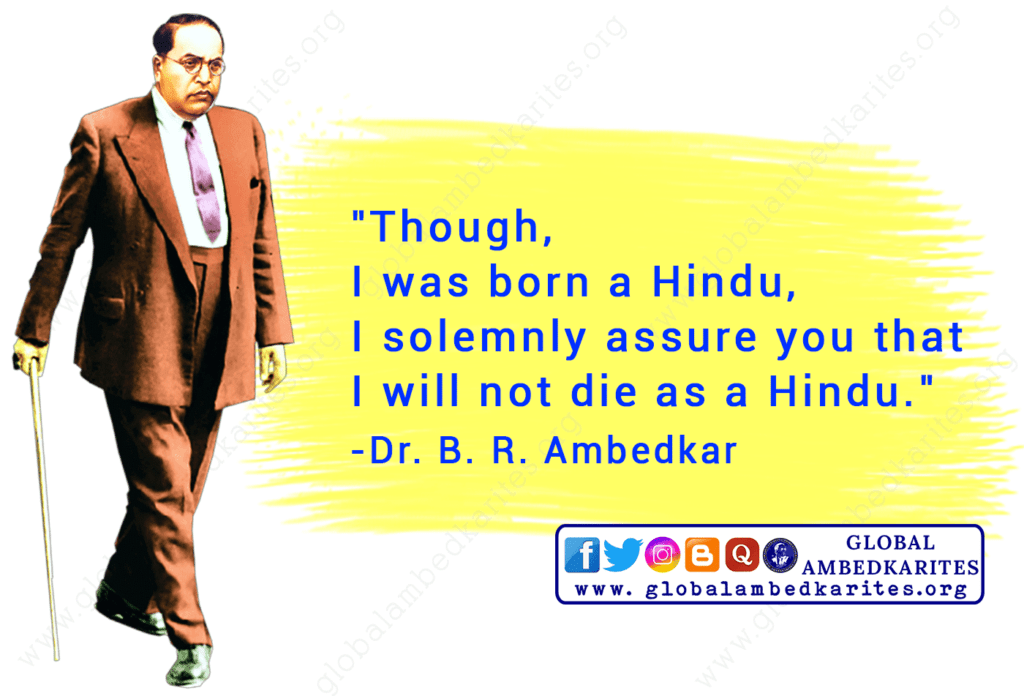
1. “Though I was born a Hindu, I solemnly assure you that I will not die as a Hindu.” – Before converting to Buddhism.
2. “I will not believe in Brahma, Vishnu and Mahesh. Neither would I worship them.” – In 22 vows administered while converting to Buddhism.
3. “The history of India is nothing but a history of a mortal conflict between Buddhism and Brahminism.”
THERE IS MORE..
EDIT:
This is for those who say that the ‘Sati’ tradition in Hindu culture started because of the fear of Muslims.
“She then prepared a blazing fire with firewood and placed the dead body of her husband upon it. When this was finished, she lamented severely and prepared herself to perish in the fire with her husband”
Bhagwad Purana (Srimad Bhagvatam) 4.28.50
Swami Prabhupada writes on this verse of Bhagwad Purana.
“It is the long-standing tradition of the Vedic system that a faithful wife dies along with her husband. This is called saha-maraṇa. In India this system was prevalent even to the date of British occupation. At that time, however, a wife who did not wish to die with her husband was sometimes *forced to do so by her relatives*. Formerly that was not the case — the wife used to enter the fire voluntarily (debatable). The British government stopped this practice, considering it inhuman. However, from the early history of India we find that when Mahārāja Pāṇḍu died, he was survived by two wives — Mādrī and Kuntī. The question was whether both should die or one should die. After the death of Mahārāja Pāṇḍu, his wives settled that one should remain and the other should go. Mādrī would perish with her husband in the fire, and Kuntī would remain to take charge of the five Pāṇḍava children. Even as late as 1936 we saw a devoted wife voluntarily enter the fire of her husband.”
~A.C Bhaktivedanta Swami Prabhupada on Bhagwad Purana 4.28.50 [Source: SB 4.28.50 – Vanisource.
ALSO READ
1. Is Hinduism a religion or a way of life?
2. “Why should Hindu Identity be given up?
3. Why are scheduled castes and tribes not Hindu?
4. Brahmins and Brahminism – Can the two be separated?
6. How does the Hindu caste system really work and what can be the solution to eradicate casteism?



